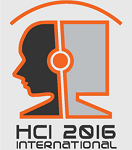Toronto, Canada, 17 - 22 July 2016
The Westin Harbour Castle Hotel
Tuesday, 19 July 2016, 14:00 - 17:30
Brendan Allison (short bio)
g.tec medical engineering GmbH/Guger Technologies OG, Austria
g.tec neurotechnology USA, Inc.
Günter Edlinger (short bio)
g.tec medical engineering GmbH/Guger Technologies OG, Austria
Objectives:
The Brain-Neural Machine/Computer Interface (BNCI) research area is a thriving and rapidly expanding field. BNCIs have been developed during the last years for people with severe disabilities to improve their quality of life. However, BNCI applications have recently been extended to different research areas, such as rapid functional mapping on the cortical level, virtual reality and rehabilitation & therapy after stroke. The Tutorial will discuss necessary prerequisites to successfully perform both invasive and non-invasive BCI experiments, and discuss progress in relevant medical domains. Live demonstrations of BNCI control will help attendees understand the technology.
Content and Benefits:
- insights into recent hardware (wireless/non wireless) for BNCI research
- insights into the software for BNCI research enabling participants to run their own experiments
- giving participants the chance to analyze their BNCI performance
- demonstrations of applications
- Assessment of consciousness (mindBEAGLE), stroke rehabilitation (recoveriX)
- discussing advantages/disadvantages of dry/wet sensors
- discussing non-invasive and invasive BCI approaches
- using BCI technologies in clinical environment (cortiQ)
Target Audience:
The goal of the workshop is to bring together researchers and interested attendees, to describe and demonstrate the options available in the field of Brain/Neural Machine Interfaces. We will highlight the usability and reliability of BCI control, which now allows developing and displaying more advanced applications. We think that such a workshop will be very appealing to audience members working in the area of HCI combining different modalities for interactions, including the medical field.
Relevant links:
- State of Art in BCI research: The BCI Award 2010 book chapter
- BCI Related Research Projects
- BCI videos: New results from g.tec and many others
- intendiX: User-Ready Brain-Computer Interface Applications
Relevant Websites:
- http://www.gtec.at
- http://www.bci-award.com
- http://www.mindbeagle.com
- http://www.intendix.com
- http://www.cortiq.com
- http://www.recoverix.at
Brief Biographical sketches





